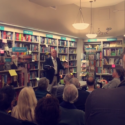Far away from Puerto Rico’s white sand beaches and Washington’s marbled corridors of power, a man who has spent years walking both recently spoke to a standing room only audience about Puerto Rico’s current political economic crisis. The popular book store where people gathered to discuss Puerto Rico’s public finance implosion was not anywhere near the U.S. island territory’s capital of San Juan or the nation’s capital in Washington.
Instead, Laguna Beach Books is a must visit crossroads for visitors from around the world who come as tourists each year to that California resort town. Over the years its occasional book release parties for authors of new literary works have made the charming book store what author Howard Hills calls “a preeminent venue for cultural education and intellectual discourse” in the seaside village’s fabled “art colony” tradition.
At the book store to give a reading from his new book, Citizens Without A State, Hills engaged in a lively dialogue with a well-read audience and signed copies for the public. Surrounded by display copies of his book, he told the crowded room, “Restoring a constitutionally sound political status and a form of national citizenship based on equal rights is not just about the future of Puerto Rico as a federal territorial client state lacking fully democratic self-government. Now that a majority of its 3.5 million U.S. citizens have voted to end the island’s current status and seek statehood, what is at stake in the future for our nation is whether the federal government will uphold the true meaning of U.S. citizenship under the Constitution.”
As an international lawyer and constitutional scholar who served as lead counsel for territorial political status negotiations in the Executive Office of the President of the United States, National Security Council and U.S. Department of State, Hills has published scholarly works on territorial law in the the most prestigious legal journals. To reach beyond the legal profession, his new book Citizens Without A State was specially written and its unique layout was designed for a general audience, not just for lawyers.
“This book will enable high school and college students, as well as the general public, to pierce the veil of the legal subculture,” Hills explained. “It will empower non-lawyers to understand the nuances of constitutional law emanating from U.S. Supreme Court decisions in federal territorial political status cases, juridical history most law students and lawyers too seldom have examined much less mastered.”
The audience at Laguna Beach Books included local authors, educators, business owners, and students from the local high school, as well law schools in the Los Angeles area. Also there was a Congressional staff member visiting town, the local Mayor, and lots of Laguna’s thriving – as well as politically active – arts and letters community. The dialogue that ensued illuminated the legal nature of national and state citizenship under the Constitution, and how our national values are being tested by governing 3.5 million U.S. citizens in Puerto Rico without equal rights under the Constitution.
For Hills this first encounter with the general public was a litmus test for whether the distillation of the essential historical and constitutional principles in the book would be accessible and “user-friendly” for his audience. The answer came not only from the questions asked by the audience after he had presented the book’s core thesis, which Hills described as “better than questions many federal judges ask in territorial law cases.” The real test was book sales, and the brisk trade after his lecture and reading ended only when the inventory of books on hand sold out!
“In my talk I quoted the Supreme Court ruling in the Thornton case, about how the framers ‘split the atom of sovereignty’ by creating dual state and national sovereignty when the 10th Amendment was added to the Constitution,” Hills explained. “I argued the framers also split the atom on citizenship with the 14th Amendment’s combination of national citizenship with citizenship in any state of residence. I explained how the 1922 ruling in the Balzac case separated national citizenship from eventual rights of state citizenship. They really got the idea that national citizenship without state citizenship is not a complete set, but just ‘Balzac citizenship.'”
The timing for “Citizens Without A State” could not be more fortuitous, or more ominous, as Congress prepares this session to debate federal measures to address what Hills calls Puerto Rico’s “failed client state syndrome.”
“Puerto Rico must be allowed to compete and realize its potential on an equal footing with the states of the union, or it must be able to act in its own interest as a sovereign nation, and its current status must end consistent with democratic self-determination,” said Hills. “Congress has its work cut out for it, correcting decades of abdication in its governance of the last large and populous U.S. territory. The fact that the Supreme Court created the dilemma faced by the territory in the 1922 Balzac case does not diminish or excuse the failure of Congress to manage status resolution before now, but rather focuses the responsibility to correct a failed federal territorial policy where it resides – in the Congress.”
Purchase “Citizens Without A State” as a physical book or PDF download or as a Kindle book. To contact Howard Hills e-mail: howard.hills@me.com








One response
[…] at Amazon. For a recent report on public reaction in the states to “Citizens Without A State” click here. […]